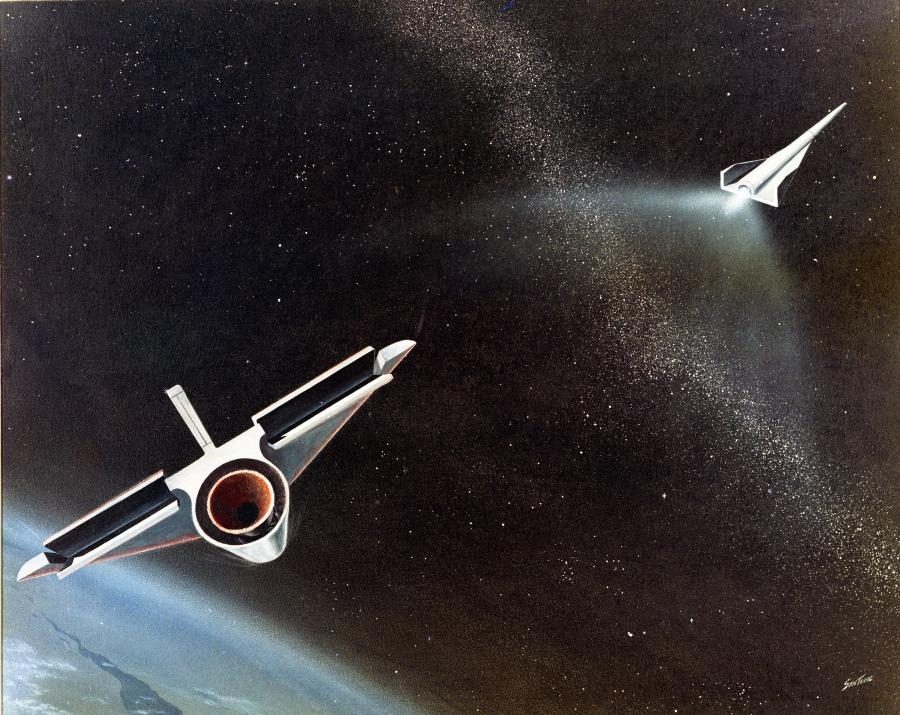Here’s the scenario — the civil rights movement is blazing across America, kids are being shipped in scads to fight a war that grows increasingly unethical every day and television has never been better. Every week, viewers escape from the dreary paranoia of the late ’60s with “Space: The Final Frontier,” riding the vehicle of progress into the surreal unknown and unexpected fantasy — except, it wasn’t escape that “Star Trek” provided to its viewers.
Media means that we live in other worlds as much as we do our own. We write our lives into scripts, resonate with characters and anticipate action and romance. Science fiction has been a way for writers to project the trajectory of the human race but also to reflect on our own condition non-intrusively. Rather than talk explicitly about McCarthyism or race, Gene Roddenberry, the creator of “Star Trek,” devised tense situations between the alien “other” and a primarily human crew of the Enterprise. The episode “Balance of Terror” introduced xenophobia into the show by questioning Spock’s resemblance to Romulans while “Let That Be Your Last Battlefield” satirized the ridiculousness of racism. Before getting swept away in personal obsession, it’s worth lingering on how science fiction raises consumerism through novelty but sticks due to its resonance with the human condition.

Here’s where the inevitable “but” comes. While writers and dreamers will never approach the asymptote for creative projections, the drive of entertainment media may steer what our interests look like. Audiences care what movies and series say in regards to current issues, but this is secondary to the general appeal of the production.
Science fiction itself can be broken into a spectrum between hard sci-fi and soft sci-fi. Hard sci-fi places emphasis on the believability of the world and the actual mechanics and functions of tools. Examples of these would be “The Martian” or “The Expanse.”
However, most of the science fiction we see on the screen might be categorized as soft sci-fi, and I mean grandma could gum this without her dentures kind of soft. These are the shows and movies which use vague words like “serum,” “nano,” “bio” and “gamma” and viewers simply blink and nod and soft sci-fi gets away with it. The most typical example of soft sci-fi would be Marvel movies and shows which border on fantasy almost in the same way that “Star Wars” does. One of their more commendable traits is their ability to laugh at themselves — they embrace the ridiculous, most explicitly in the fourth-wall-breaking “Deadpool.” Marvel’s media is almost undetectable as sci-fi because of this quality — they remind us at every turn that it invests in characters and plot, relying on themes that are general enough to be ubiquitous. We occasionally get social commentary, but as blockbuster entertainment, making too strong a statement would cause them to lose a good deal of their audience in such a partisan environment. Instead, like an early interest in space exploration, soft sci-fi banks on escape.

The space frontier particularly cropped up in ’60s advertisements — spacesuits and tea, rocket ships and food. The connection didn’t need to be clear, it just had to convey the surreal ability a product would grant, genie style. Our advertisements today don’t differ much. They all have the same message — “welcome to the future.” For the consumer, the future means to escape. Science fiction asks what we will look like when we have heightened power — how it will affect our autonomy, our privacy and especially our relationships. This is what makes “Black Mirror” and other writings, such as “The Twilight Zone,” following its example such a blessing. “Black Mirror” perfectly encapsulates the madness, fear and euphoria of each one of us and adds something more. The show offers a focused look at humanity with the benefit of indirect commentary.

But there’s still the age old question — how does capitalism affect art? Our desire for entertainment, love of innocuous plots and fascination with the near reality of speculated technology might eventually elbow out hard-to-swallow social criticism. Maybe it won’t be the end of the world and we’ll have grown enough to have these public discussions without the shield of fiction. If this is the case, though, we might miss out on opportunities to have discussions without enraged backlash. With how ingrained Because sci-fi has become so ingrained in our cultural conscience, fiction will change with our own face. If we close our eyes to the potential for science fiction, it might blink out of existence.
















MCSFO • Jun 17, 2019 at 12:02 am
Great article Alison!! You’re preaching to the choir, but it can get really tough at times when you’re a science fiction marketing company! MCSFO – a new marketing agency promoting only sf content, is dedicated to supporting well done hard sci-fi, they just need more of them to support. This is why they produce the Atlanta Science Fiction Film Festival to attract some of the best sci-fi filmmakers around the world! Fortunately there are a lot of filmmakers that are heavily influenced by Black Mirror, The Expanse and HBO’s Westworld, but a lot of people are in a rush and caught up with VFX, it’s easier to write soft sci-fi because it doesn’t require deep intellectual thought and research! We all like a fun sf joy ride every now and again, and it’s great for the “familiars,” but for those who are looking for something more, we shouldn’t have to travel to the vast reaches of space for it.